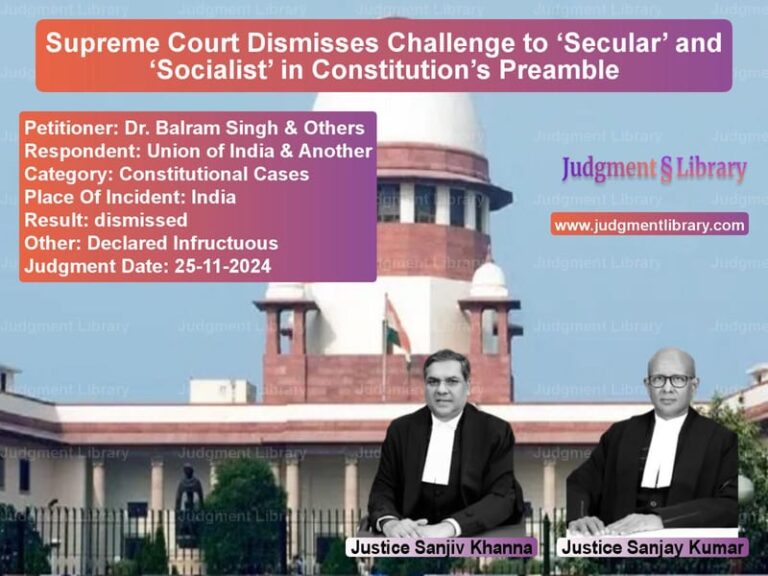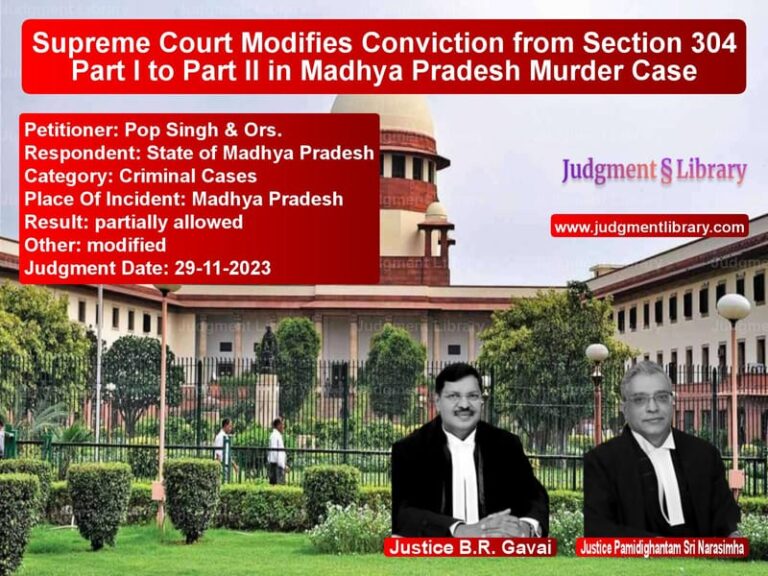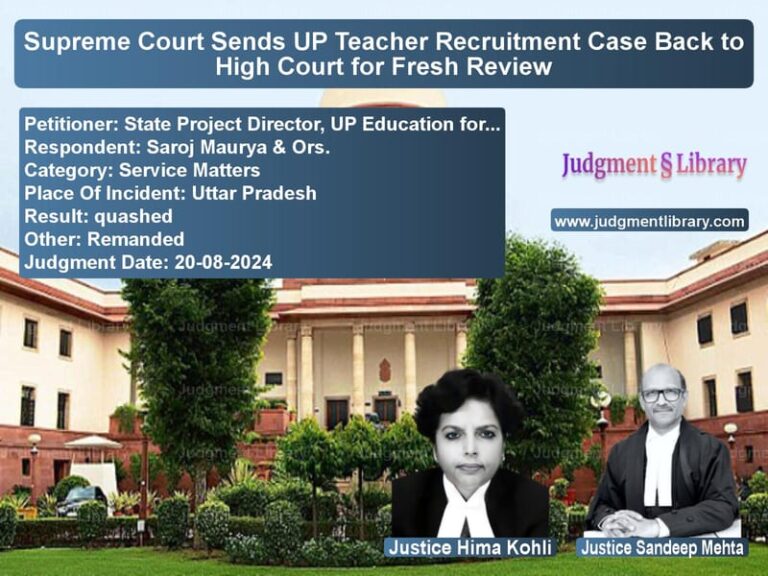Supreme Court Upholds SARFAESI Act Property Auction, Orders ₹54 Lakh Settlement for Borrower
The Supreme Court of India has delivered a significant ruling in the case of Bombay Mercantile Cooperative Bank Ltd. vs. M/s U.P. Gun House & Ors., addressing the long-standing legal battle over the auction of a mortgaged property under the Securitisation and Reconstruction of Financial Assets and Enforcement of Security Interest Act, 2002 (SARFAESI Act). The Court upheld the auction of the disputed property while also directing the bank to pay ₹54 lakh to the borrower, ensuring fair compensation for potential procedural lapses.
Background of the Case
The dispute arose from a loan transaction dating back to 1996, when the borrower, M/s U.P. Gun House, secured a loan of ₹2 lakh from Bombay Mercantile Cooperative Bank Ltd.. The loan was backed by a mortgage of a 3,300 square feet commercial property in Lucknow, Uttar Pradesh.
Timeline of Events
- 1996: M/s U.P. Gun House availed a loan of ₹2 lakh against mortgaged property.
- 2002: The loan was classified as a Non-Performing Asset (NPA) with an outstanding amount of ₹2,39,812.
- 2006: Due to non-payment, the outstanding amount escalated to ₹6,23,809.
- 2006: The bank issued a demand notice under Section 13(2) of the SARFAESI Act.
- 2009: The bank took symbolic possession of the property after the borrower failed to pay the dues.
- 2012: The bank revoked a One-Time Settlement (OTS) agreement after the borrower defaulted on agreed payments.
- 2012: The bank initiated an auction sale of the property, selling it for ₹42 lakh.
- 2013: The auction purchaser, Abdul Haleem Siddiqui, obtained the sale deed and took possession of the property.
Legal Dispute
The borrower, M/s U.P. Gun House, challenged the auction sale on the grounds that:
- The auction was conducted without proper notice.
- The bank did not provide sufficient time for repayment.
- The property was sold at an undervalued price.
- The borrower had made partial payments, which should have been considered before initiating the auction process.
Legal Issues Before the Supreme Court
- Whether the bank followed due process under the SARFAESI Act before conducting the auction.
- Whether the borrower was given adequate opportunity to repay the loan.
- Whether the auction purchaser’s rights were affected by the borrower’s objections.
- Whether monetary compensation should be awarded to the borrower.
Petitioner’s Arguments (Bank)
The bank, represented by senior counsel, argued:
- The borrower repeatedly defaulted on the loan despite being given multiple opportunities.
- The auction process was legally valid and conducted in accordance with the SARFAESI Act.
- Public notices of the auction were published in leading newspapers, ensuring transparency.
- The borrower was aware of the auction but failed to exercise his right of redemption.
- The auction purchaser had already developed the property and transferred portions of it to third parties.
Respondent’s Arguments (Borrower)
The borrower contended:
- He was not properly notified about the auction proceedings.
- The bank acted arbitrarily by revoking the One-Time Settlement (OTS) agreement.
- The property was sold at an unfairly low price, causing him financial loss.
- The auction should be canceled, and the property restored to him.
Supreme Court’s Observations
The Supreme Court, after analyzing the evidence and legal framework under the SARFAESI Act, observed:
“The borrower was fully aware of the auction proceedings but failed to exercise his legal remedies in time. The challenge raised at this stage is not justified.”
“While the bank followed most legal requirements, it failed to maintain proper records proving personal service of auction notices to the borrower.”
“The auction purchaser has invested significant resources in developing the property, and any further litigation would cause undue hardship to third-party buyers.”
Final Judgment
The Supreme Court ruled:
- The auction sale in favor of Abdul Haleem Siddiqui was upheld.
- The bank was directed to pay ₹54 lakh to the borrower as a settlement amount.
- If the payment is delayed, the bank must pay 12% interest per annum on the amount.
Implications of the Judgment
The ruling has significant implications for both borrowers and financial institutions:
- Protection of Auction Purchasers: The judgment upholds the rights of legitimate auction purchasers, preventing unnecessary challenges to finalized sales.
- Fair Compensation for Borrowers: Even if an auction is upheld, borrowers may be entitled to compensation if procedural lapses are identified.
- Stricter Compliance for Banks: Financial institutions must ensure complete transparency in loan recovery processes and maintain documentary proof of all notices served.
- Judicial Balancing Act: The Court struck a balance between the rights of the bank, the borrower, and the auction purchaser, ensuring fairness for all parties involved.
Conclusion
The Supreme Court’s ruling in Bombay Mercantile Cooperative Bank Ltd. vs. M/s U.P. Gun House highlights the critical need for transparency in the enforcement of security interests under the SARFAESI Act. By upholding the auction while awarding compensation to the borrower, the judgment reinforces the importance of due process while also safeguarding the rights of financial institutions and auction purchasers.
This case serves as a significant precedent for future disputes related to loan recoveries and property auctions in India, ensuring that all stakeholders are treated fairly under the law.
Petitioner Name: Bombay Mercantile Cooperative Bank Ltd..Respondent Name: M/s U.P. Gun House & Ors..Judgment By: Justice Sanjiv Khanna, Justice Dipankar Datta.Place Of Incident: Lucknow, Uttar Pradesh.Judgment Date: 22-01-2024.
Don’t miss out on the full details! Download the complete judgment in PDF format below and gain valuable insights instantly!
Download Judgment: bombay-mercantile-co-vs-ms-u.p.-gun-house-&-supreme-court-of-india-judgment-dated-22-01-2024.pdf
Directly Download Judgment: Directly download this Judgment
See all petitions in Bankruptcy and Insolvency
See all petitions in Corporate Compliance
See all petitions in unfair trade practices
See all petitions in Judgment by Sanjiv Khanna
See all petitions in Judgment by Dipankar Datta
See all petitions in allowed
See all petitions in Modified
See all petitions in supreme court of India judgments January 2024
See all petitions in 2024 judgments
See all posts in Corporate and Commercial Cases Category
See all allowed petitions in Corporate and Commercial Cases Category
See all Dismissed petitions in Corporate and Commercial Cases Category
See all partially allowed petitions in Corporate and Commercial Cases Category







